Contact us for Application Support as a Social Equity Candidate
We are actively searching for social equity candidates who want to apply for a cannabis license. Please take a moment to reach out to us and we will give you more details on ho we can match you up with a potential licensable opportunity! Read below this contact form for our article outlining LA’s social equity program.
This article on social equity is the opinion of our cannabis industry researchers and not the official statement or opinion of CREC. Contact with the Department of Cannabis Regulations (DCR), interviews with local business owners, and very many long hours of regulations review led to this in-depth analysis of the L.A. Social Equity Program along with the concept of social equity as a whole.
Social equity is a very current and unfolding controversial topic in the growing cannabis industry.
Let’s start this story from the beginning to give a full perspective…
California has long been the leader in revolutionary cannabis laws over the last two decades, starting as the first U.S. state to legalize use of medical marijuana in 1996.
 The blue state has heartily championed for more liberal laws, succeeding in 2016 with California’s Medicinal and Adult-Use Cannabis Regulation and Safety Act (MAUCRSA). This removed the state’s prohibition on recreational use, or “adult-use” of marijuana as of January 1st, 2018.
The blue state has heartily championed for more liberal laws, succeeding in 2016 with California’s Medicinal and Adult-Use Cannabis Regulation and Safety Act (MAUCRSA). This removed the state’s prohibition on recreational use, or “adult-use” of marijuana as of January 1st, 2018.
This act finally opened the door for niche and ancillary businesses, like our cannabis real estate services, to enter the market. With the passing of the new zoning regulations, thousands of viable cannabis properties in the state realized their sizable profit potential in this new world.
With the new laws, local jurisdictions have now been scrambling to create regulations for established and hopeful cannabis businesses to operate, with each district customizing these ordinances according to their own needs and projections. But the current landscape of business owners does not match the disproportionately impacted areas from the War on Drugs.
The goal of this article is to give a fair hearing to both conversations about social equity in order to fully understand the social importance of it, the impact on the local economy and give possible suggestions for the future of similar local cannabis ordinances across the country.
Table of Contents
- What is the Definition of Social Equity?
- Three Phases of Processing Applications
- L.A. Social Equity Program Tiers List
- The Argument for – Social Equity
- The Argument Against – Social Equity
- How will it Affect Tax Revenue?
- What are the Results so Far?
- Suggestions for the Future
What is the Definition of Social Equity?
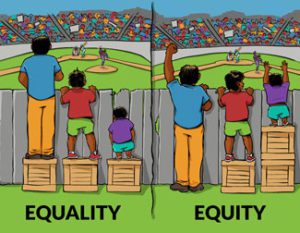
Simply put, social equity is defined as social policy that is concerned with the concepts of justice and fairness. It is by no means a new concept, but in recent times the application of social equity to policy has been garnering more attention to communities that feel underserved by their public administration.
Social Equity for cannabis in Los Angeles is extremely complicated. Trying to piece together this insanely detailed process has taken me weeks of discussions with the Department of Cannabis Regulations (DCR), various cannabis business owners and real estate consultants, as well as communications from a few cannabis lawyers. Any other city’s application process seems like cake to put together compared to this.
“This is not about race,” said Donnie Anderson, co-founder of the California Minority Alliance, which advocates for the inclusion of people of color in the marijuana industry. “This is about communities that were hurt by the failed war on drugs.” (Featured Image)
About the Recent Social Equity Program in Los Angeles
Los Angeles City, long known for its sordid role in the War on Drugs, has taken this opportunity to not just be revolutionary, but re-conciliatory with its highly controversial and groundbreaking Social Equity program.
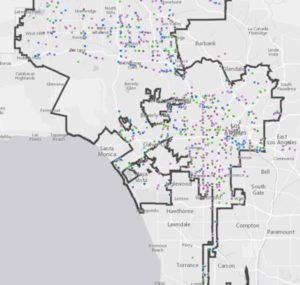
After established co-ops who have spent years paying their dues get first dibs on licensing (Prop M), those who qualify for social equity will get their shot at taking advantage of priority processing of applications for licensing.
In Los Angeles, the social equity ordinance gives priority license processing specifically to residents who have been most affected by the War on Drugs. This has caused an outpouring of polarized opinions across the board from the community.
Community organizers and even local policing authorities are championing this ordinance as a way to boost the economy in these areas. However, cannabis investors who’ve focused energies west for the Green Rush to invest in cannabis are told to wait at the back of the line for licensing–or get involved with the Social Equity program. It’s controversial but an interesting social experiment.
I’ll do my best to break it down simply…
Three Phases of Processing Applications
There are three phases to the L.A. Social Equity program’s planned processing of business applicants.
Phase One
Proposition M Priority Licensing: Established co-ops who have been paying their dues since legalization of medical marijuana in 1996 will have the first go at licensing their retail business for adult-use. Newer retail business can also apply under Prop M, as long as they have a Business Tax Registration Certificate (BTRC) and can prove they’ve been paying taxes in 2016 and 2017 and zoned correctly for their cannabis business.
Phase Two
Social Equity applicants for retail and non-retail businesses (manufacturing, cultivation, testing, etc) get their turn to apply. There are three tiers of qualifications for a social equity applicant which will be explained down below.
When speaking with the Los Angeles Department of Cannabis Regulations (DCR), they stated that for every two Prop M approved licenses, one will be approved for social equity.
Phase Three
General Processing phase: Everyone who doesn’t qualify for Prop M or Social Equity gets to apply during this phase. No provisional licenses will be offered, which means any illegal businesses need to shut down operations until granted a license.
L.A. Social Equity Program Tiers List
There are also three tiers of qualifications for applying to the Los Angeles social equity program.
They are trying to incentivize existing businesses to take part in the program by including Tier 3, expanding the resource pool for the benefit of Tiers 1-2.
Tier 1
- Applicant must be low income and a prior cannabis-specific conviction on their record.
- Applicant must have lived in a disproportionately impacted area (areas specified as most negatively affected by the War on Drugs) for a minimum of five years cumulative residency.
- Applicant has to own at least 51% of a business that would benefit from licensing.
- Applicant will receive benefits from Tier 2 and 3 participants:
- Expedited renewal process, business, license and compliance assistance, site specific conditions, access to an Investment Fund if established and potential for fee deferrals.
Tier 2
- Doesn’t require a cannabis conviction
- Applicant must have low income and a minimum of five years in a disproportionately impacted area; or
- A minimum of ten cumulative years in a disproportionately impacted area
- Must own at least 33.3% of the business
- Has to enter into a Social Equity Agreement with the City to provide the above mentioned benefits to Tier 1 applicants.
- Will receive above mentioned benefits with the exception of fee deferrals and access to Investment Fund.
Tier 3
- Has to enter into a Social Equity Agreement with the City to provide the above mentioned benefits to Tier 1 and 2 applicants in order to receive expedited renewal processing and site specific conditions for the program.
- Must provide Tier 1 applicants with access to a property rent-free and with two years of prorated utilities. (The amount of space required is broken down by permit type; ie; cultivation, manufacturing, etc.)
As of the writing of this article, only Phase 1 has been enacted (2/9/18), with no indication of when Phase 2 Social Equity applicants will be able to start submission.
The applications haven’t even been released. It is written in the ordinance that after the release of the Phase 1 applications, the application period would be 60 days. There was no specification on when the next phase would start after Phase 1 closes. However, my contact at the DCR stated that the “higher ups” already have a date in mind.
The Argument for Social Equity Programs in Los Angeles

In Los Angeles, the community that feels underserved, or in their words “disproportionately impacted areas” are those districts with the highest cannabis-related arrest counts. This resulted in 33 police reporting districts recommended for inclusion in the social equity program.
These districts were pulled from a social equity analysis report submitted to the city for consideration when writing up the ordinance. These communities basically demanded a program like this, attending city council meetings and insisting their struggle be considered.
But who was going to be their voice? Who’s running this thing?
Recently, the Los Angeles City Council voted in Cat Packer, 26, to head the Department of Cannabis Regulations. The vote was unanimous, but long-time industry consultants and other operators in Los Angeles protested this appointment due to her age and relative inexperience. However, Packer’s bio on the DCR website describes previous experience with implementation of cannabis policy reforms working for the Drug Policy Alliance.
Despite the negative reaction from seasoned industry folks, Packer has been vocal about her passion for the Social Equity program, promising that the department will protect L.A.’s neighborhoods and children, require environmental protections and rally around legal cannabis business development. In a recent article published by the L.A. Times, she was quoted as saying, “It’s extremely important that as this industry develops in the city of Los Angeles, that it’s done with consciousness.”
Why does Cat Packer think Social Equity will repair relationships?
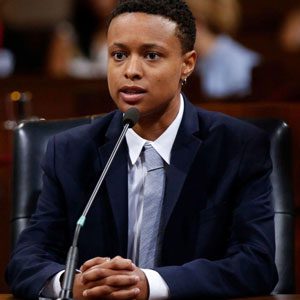
Packer and her constituents are convinced that L.A.’s Social Equity program would not only boost the economy in disproportionately impacted areas, but that it would begin to repair relationships between the city and these areas for the destructiveness of the War on Drugs.
This argument is pulled from decades of data given by the LAPD in the analysis report supporting the claim that certain areas and minorities in Los Angeles have been unfairly targeted.
An example of disproportionately impacted areas:
White residents make up 28% of the population and account for 6% of all cannabis-related arrests between the year 2000 and 2017. Conversely, black residents make up 40% of all cannabis-related arrests, but only account for 9% of the population.
What’s interesting about this statistic is that the data shows that each group committed cannabis-related crimes at the same rate. This suggests a glaring lack of justice served in this community.
With the current information available from the social equity analysis report, only 1% of storefront owners are black.
This indicates that since the legalization of cannabis in California, white people have significantly benefited even though people of color have carried the heaviest load of law enforcement upon their backs. Unfair? Absolutely. Thus the need for social equity.
It is still to be determined if Cat Packer is the person to pull this off.
All the stipulations for social equity will most definitely help in weeding out illegal dispensaries operating within the city’s borders, aiding the fight to legitimize the cannabis industry. With hundreds of illegal cannabis retail businesses in place, regulation will create a safer way to buy and consume, and the Social Equity program definitely draws a line in the sand of who is invited to this party.
The Argument Against Social Equity in Los Angeles
As mentioned earlier, the social equity program is insanely complicated.
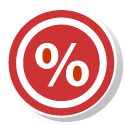
This is a huge deterrent from potential applicants to even get involved. Existing business owners and entrepreneurs are just now realizing the hoops they’ll have to jump through to get priority processing and are worried there won’t be an avenue for licensing once it’s their turn.
This discouragement can potentially turn off investors from considering Los Angeles as an option for starting new cannabis businesses, especially since in order to get priority processing they would have to give up 33.3-51% of their business.
In speaking with various business owners in Los Angeles, one in particular who requested to remain anonymous stated, “I feel like I’m being pushed out of the business I’ve worked so hard on for so many years.” The individual I spoke to does not qualify for social equity, however several applicants surrounding his store do, which would in fact push him out of being able to get licensed for retail. He is one of hundreds of cannabis businesses in the same position.
Some non-cannabis business owners are getting in on the game after realizing their properties qualify as high-priced cultivation listings, increasing the competitiveness.
How will social equity programs affect tax revenue?
Another major concern from the opposition is that the city will be regretting this decision come tax time. As seen in Colorado, the increase in cannabis businesses provided a massive boom in revenue with record-breaking results.
However, businesses did not plan for or prepare for the amount of taxes they would have to pay. In failing to set aside money, the tax revenue from the sale of marijuana in the first year was underwhelming.
Marijuana Taxes, License, and Fee Revenue
Updated January 2018. Calendar year is defined as January 1 – December 31
Calendar Year | Total Revenue |
2014 | $67,594,323 |
2015 | $130,411,173 |
2016 | $193,604,810 |
2017 (Jan-Dec) | $247,368,473 |
Source: Colorado Department of Revenue
While this chart would suggest that the total revenue is increasing at exciting rates (currently passing $500 million in Colorado), revenues in the first and second year were moving at a snail’s pace compared to previous projections. Consumers were becoming familiar with the new system and state and local authorities had to spend tons of time and money setting up a new infrastructure.
The tax imposed on marijuana in Colorado hiked so high residents became concerned it couldn’t compete with black market prices. Its slow start was attributed to some businesses just not having enough money to pay the taxes put upon them, leaving many business owners with no choice but to sell and move on.
Colorado has always been a measuring stick of sorts for other states, being the first state (along with Washington) to legalize adult-use of cannabis. It makes sense that residents of Los Angeles would have the same concerns as those Colorado taxpayers. With no provision in the ordinance for applicants to provide a tax plan or some sort of fail-safe for paying taxes that they are not accustomed to paying, it could potentially spell disaster for Social Equity applicants come tax time.
Are Social Equity Programs Working?
The reason this program is so revolutionary is because up until this point, there hasn’t been anything like this done in the cannabis industry. Oakland is currently trying something similar with their medical marijuana dispensaries, but this is a different animal. This also means there is no evidence to provide that it will be successful.
Lastly, a Tier 1 Social Equity applicant can get denied licensing by the state even if they’ve been approved by the City of Los Angeles. The state of California’s cannabis ordinance is the main guidance for most applicants. In talking with various cannabis business owners, if requirements for the city are a little vague, the state’s ordinance is their fail-safe to ensure compliance.
As it stands currently, a retail cannabis applicant with the state can be denied at the state’s discretion if the applicant has a felony cannabis-related conviction. This directly conflicts with the city’s requirements for being a Tier 1 Social Equity applicant.
This grey-area is literally a “wait and see” situation with no way to tell if the state will play ball with the city. With so many unknowns, it’s a risky endeavor that may lead to financial disaster for the city.
What results have we seen so far?
With only one other city in California attempting to implement similar social policy, it’s nearly impossible to predict how successful the Social Equity program in Los Angeles will be. However, I can attest to general reactions from the community in my reporting regarding what I believe will work or what won’t work after taking it all in.
Even though this is arguably the most complicated application process for any city in the state of California, the Social Equity program will have no shortage of applicants.
As of writing this article, 257 Adult Use Retail applications had been submitted to the DCR and 262 Medical Retail applications. So far, 98 applications have been granted a temporary license under Phase 1 for Prop M applicants. The more these applications get approved the more competitive it will become for Phase 2 for Social Equity applicants considering the 2:1 ratio.
A representative from the DCR confirmed to me that they have no specific date for when those applications will be released, but that hundreds of applicants are expected.
Is community involvement important to the program’s success?
The community as a whole has shown a fevered interest in the social equity program with more attendance for cannabis issues present at city planning meetings than any other issue presented in the last year. There is no doubt that social justice should be addressed with respects to legalizing adult-use of cannabis in this city.
I’ve come across too many stories in my research that support this. I also have years of professional involvement with parolees negatively affected and held back from successful rehabilitation and reintegration because of cannabis prohibition. Community involvement will be absolutely critical in seeing the program through to execution; raising concerns when things are not working and showing support for what is.
If the city can keep the community as involved as it has been, in that respect it can be perceived as successful.
It will probably take at least 1-2 years for the program to work out its kinks and for true results to be calculated in regards to the disproportionately impacted areas this program aims to benefit. If we see an influx of business owners in those districts, it would logically suggest the local economy will benefit.
Clearly due to the newness of the idea of applying social equity to the cannabis industry, there will be problems, hiccups and some failure. The unknown of it all is what makes this an exciting piece of sociological history.
Suggestions for the Program’s Future
It is my concern that with no provisions for these new business owners to get tax assistance they will fall flat on their faces come tax time and be forced to sell their businesses.
![]()
The purpose of the social equity program is to put the fair share of the lucrative cannabis market in the hands of those most affected by the drug war and in time, this tax issue could render it useless before projected revenues hit beneficial amounts. Whether that provision be through a requirement in the ordinance to have an accountant on staff or as part of the benefits received as a social equity applicant, something needs to be included.
Without a provision, this could become the biggest set up for failure the city has ever seen since the beginning of the War on Drugs. Not only could businesses be forced to sell, but it could set up the black market to benefit from no tax structure with taxes primed only to increase.
It’s a beautiful concept but without structured follow through and enforcement, in a few years time social equity could be perceived as a puny, disingenuous offering of reconciliation. According to the ordinance regarding enforcement, taxation and regulation of adult-use dispensaries they are being charged a 10% levy — $100 for every $1000 sold. This is a far reach from what even experienced dispensaries were required to pay previously.
Additionally, the concerns from the cannabis industry as a whole about Cat Packer being assigned as Director of the DCR have some merit.
Perhaps a way to set the existing industry at ease with her placement is to allow organizations such as the ACP or NORML chapters create a consulting group within the DCR. This will increase Packer’s resources and availability to those people who may have benefitted unjustly, but who also have the social benefit of experience to lend to those new to the industry such as Packer herself.
This eliminates the one-way pressure of the Social Equity Agreement specified in the Tier requirements and creates a two-way street of benefits.
Lastly, the complicated nature of the application process should be simplified. Hundreds of applications could be denied due to some vague language in the ordinance. One L.A cannabis dispensary owner I spoke to is planning to apply as a Tier 3 applicant and was trying to figure out if he could apply for multiple locations with the same Tier 1 applicant he would be paired with.
It’s unknown as of now how the city expects Tier 3 applicants to even find Tier 1 applicants. Will there be a list of approved applicants? Will Tier 2 and 3 applicants not be able to apply until Phase 3 with everyone else?
There are still so many questions that the DCR cannot answer at this time. It’s important for us to ask ourselves if it’s ethical to make a beaten horse jump through 17 fiery hoops just to get a carrot?
Final Thoughts
Social Equity aims to fix the unfairness and I wholeheartedly hope that it succeeds. Time is needed and as as changes occur, so will edits to this article. We may see skyrocketing improvements in the impacted areas in the next few years.
As a woman in the cannabis industry and an ally to people of color and other marginalized groups, I hope with all my heart Cat Packer is the right person for the job. Fairness is an idea we are taught in kindergarten when everyone wants their equal piece of the pie.
As legalization of cannabis becomes more and more accepted throughout the country, future ordinances will be written with Los Angeles’ Social Equity program as the precedent. There’s so much this needs to get right on the first try.
Regardless of the results, the momentum of conscious awareness in California in regards to both legalization laws and social equity is what makes this state so special and historic. We are pioneers navigating the Cannabis “Oregon Trail”, marking a way no one’s been before to make for easier travel for those that come after us. With just as much potential for disaster (but probably with less dysentery) as success, the future of L.A.’s Social Equity program is one to watch and be a part of.
To be updated on changes in the social equity program in Los Angeles, as well as other trends in cannabis real estate and the industry as a whole, sign up for our newsletter to stay in the loop.
If it seems like a good time to get into the cannabis industry, you’d be right. Read about how to get your foot in the door in our detailed blog.
How To Get Into Cannabis Industry
Featured image credit – Donnie Anderson, co-founder of the California Minority Alliance, is one of the owners of Medex, a marijuana dispensary on Century Boulevard in South L.A. (Luis Sinco / Los Angeles Times – http://www. latimes.com/local/lanow/la-me-ln-marijuana-equity-20171020-story.html)

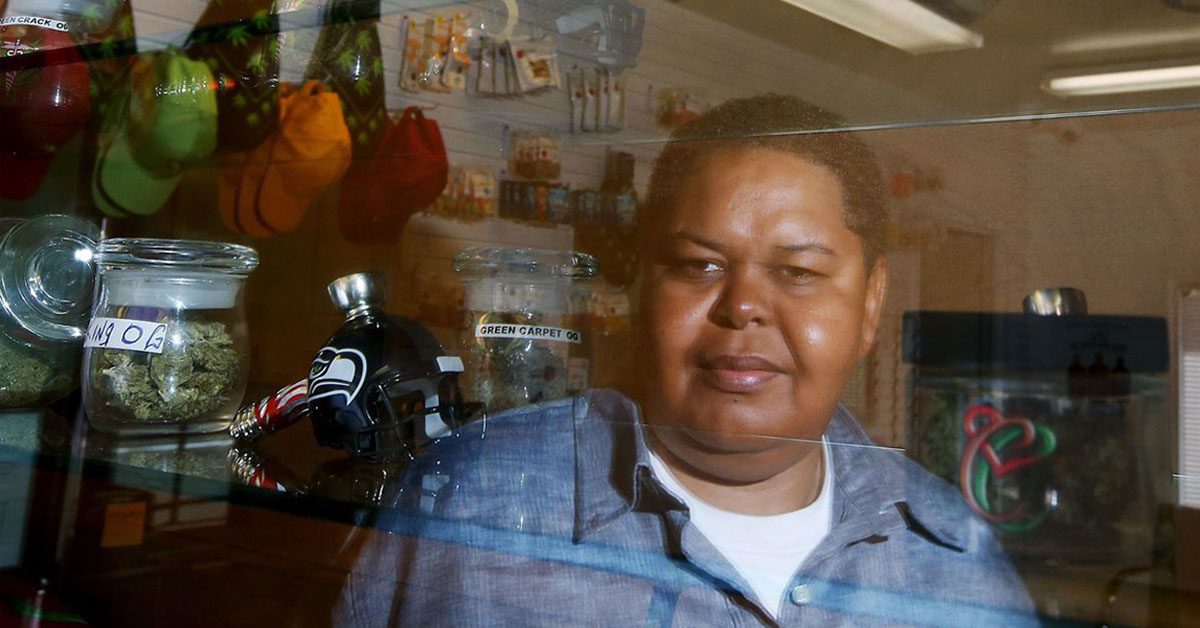
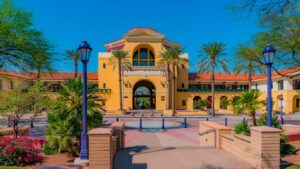
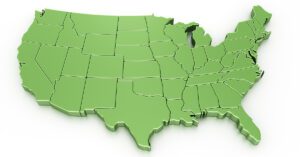
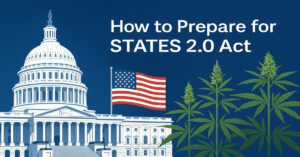

4 comments
Bella Dushner
As one of the people who used marijuana i think legalizing it in our country is ok. Many of us nowadays used marijuana as medicine for there illness. I have witnessed one of my friend who continuously using CBD as one for her medicine to treat her breast cancer. And this article shows https://www. worldwide-marijuana-seeds.com/blogs/marijuana-news/how-should-america-proceed-with-marijuana not only in America should be legalized this but all over the world also.
Wil Antonides
How does someone apply for Social Equity consideration? Is there an application form? Where do I find it?
Adriana Gomez
If you feel you qualify for the Social Equity Program, please do not hesitate to contact us at info@socialequityla.org.
We offer screening, training and capital opportunities.
Adriana Gomez
If you feel you qualify for the Social Equity Program, please do not hesitate to contact us at info@socialequityla.com
We offer screening, training and capital opportunities.